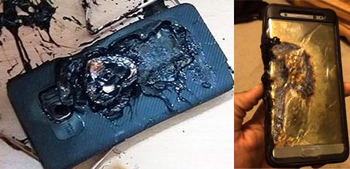Seoul, Jan 23: The world's biggest smartphone maker Samsung blamed faulty batteries today for the fires that led to last year's humiliating recall of its flagship Galaxy Note 7 device.

The giant conglomerate was forced to discontinue the smartphone -- originally intended to compete with Apple's iPhone -- after a chaotic recall that saw replacement devices also catching fire.
The debacle cost the company billions in lost profit and reputational damage.
"We sincerely apologise for the discomfort and concern we have caused to our customers," Koh Dong-Jin, the head of Samsung's mobile business, told reporters in Seoul.
Samsung acknowledged that it provided the specifications for the batteries, adding in its statement: "We are taking responsibility for our failure to ultimately identify and verify the issues arising out of battery design and manufacturing.
"We have taken several corrective actions to ensure this never happens again."
It deployed around 700 researchers and engineers on its investigation, testing more than 200,000 fully-assembled devices and more than 30,000 batteries, it said.
Samsung announced a recall of 2.5 million units of the oversized Galaxy Note 7 in September 2016 after several devices exploded or caught fire, with the company blaming batteries from a supplier, widely believed to be its sister firm Samsung SDI.
When replacement phones -- with batteries from another firm, largely thought to be Chinese manufacturer ATL -- also started to combust, the company eventually decided to kill off the Note 7 for good.
The fiasco took a major toll on the reputation of the firm, which is set to announce fourth-quarter and full-year results on Tuesday.
It promised to reform its production and quality controls to prevent a similar crisis, and said today: "The lessons of the past several months are now deeply reflected in our processes and in our culture."
Samsung shares were up 0.5 per cent at 1.87 million won in Seoul today morning after the announcement.
Samsung's English-language Samsung statement referred only to Galaxy Note 7 "incidents" but in Korean it spoke of "damage by fire".





Comments
Add new comment